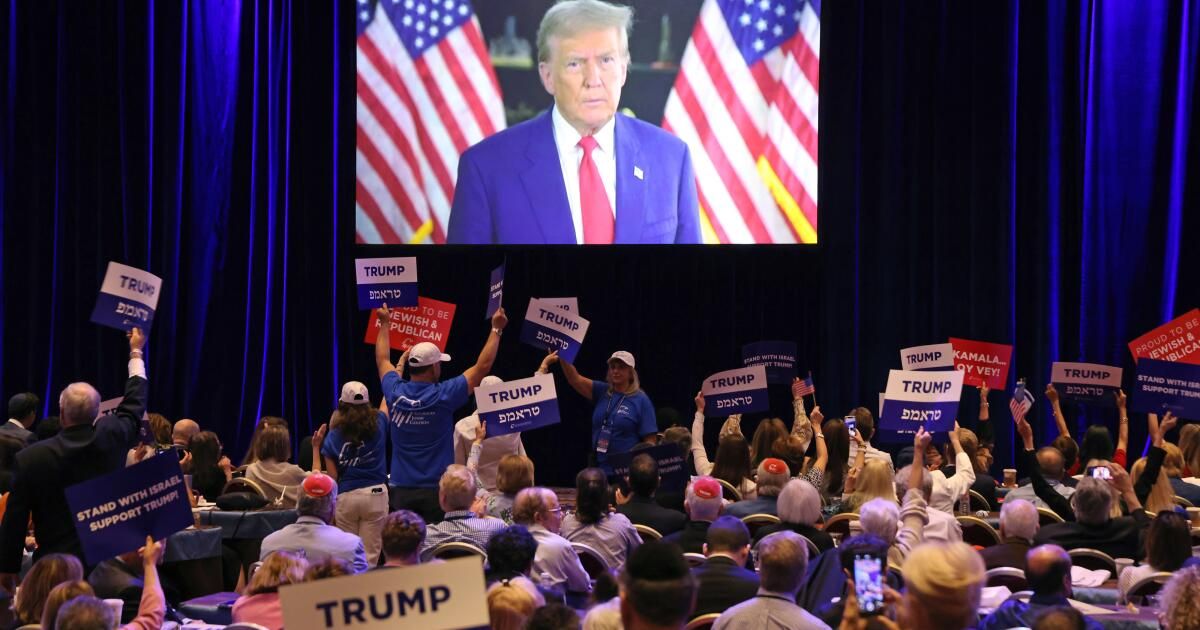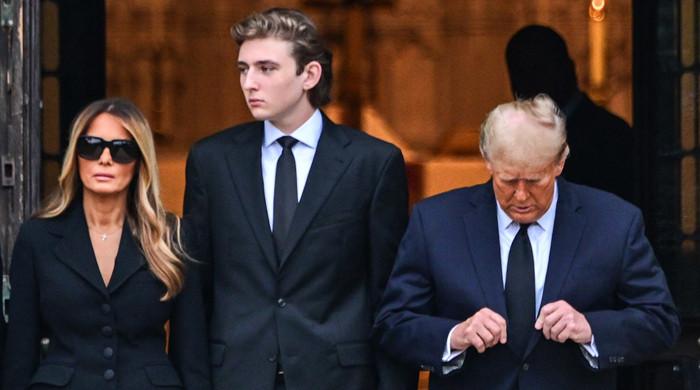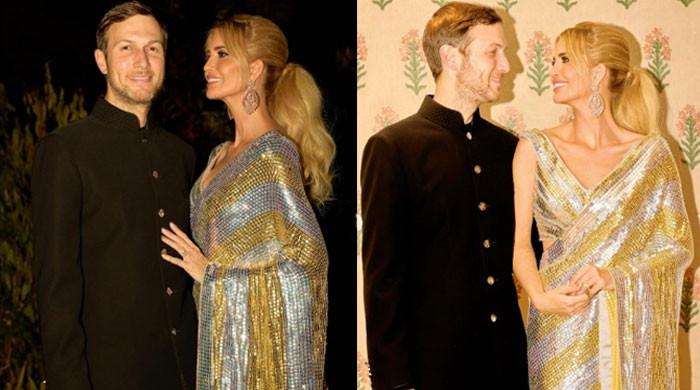Former President Trump painted a grim picture of the effect a Kamala Harris presidency would have on the future of Israel and the security of the Jewish people in the United States as he courted Jewish Republicans on Thursday and urged them to convince their non-Republican friends to support him in the November election.
“Kamala Harris is the candidate of the forces that want to destroy Western civilization and Israel,” he told about 1,000 members of the Republican Jewish Coalition gathered at the Venetian in Las Vegas for its annual leaders summit. “If Kamala Harris wins, terrorist armies will wage an unceasing war to drive Jews out of the Holy Land… Israel will no longer exist.”
The former president spoke via satellite just days after six Jewish hostages kidnapped during Hamas’s Oct. 7 attack on Israel were found executed in an underground tunnel in the southern Gaza Strip, including Hersh Goldberg-Polin, a 23-year-old from Berkeley. A lit table with tablecloths, china and glasses sat empty — to symbolize the hostages still in captivity as well as those killed — during dinner Wednesday night.
This comes after months of Democratic division over the Biden administration's response to the attack and Israel's subsequent response, which has killed tens of thousands of Palestinians in the Gaza Strip.
Trump, noting that he received about a quarter of the Jewish vote in the 2020 presidential election, said he expected to receive about 50% in November because of steps he took while president, such as moving the U.S. embassy from Tel Aviv to Jerusalem and negotiating the Abraham Accords, under which Bahrain and the United Arab Emirates recognized Israel’s right to exist. The agreement was later expanded to include Sudan and Morocco.
“I just ask you who are the 50% of Jewish people who vote for these people who hate Israel and don't like the Jewish people,” Trump said.
The former president has faced harsh criticism for his own statements and actions, including saying “there were very fine people on both sides” after white nationalists marched through Charlottesville, Virginia, chanting “Jews will not replace us!” and dining with a Holocaust denier at his Mar-a-Lago estate in Florida.
In a statement, Morgan Finkelstein, a national security spokesperson for Harris’ campaign, said: “Donald Trump has made clear that he would turn against Israel at any time if it served his personal interests, and indeed he has done so in the past.”
Harris, he added, “has been a lifelong supporter of the State of Israel as a safe and democratic homeland for the Jewish people. She has an unwavering commitment to Israel’s security and will always defend its right to defend itself.”
She also stands “firmly against anti-Semitism both at home and abroad and will do the same as president,” Finkelstein said.
The Republican Jewish Coalition (RJC), founded nearly 40 years ago under a different name, aims to attract Jewish voters to the Republican Party. While American Jewish voters are unlikely to switch parties in large numbers, if Republicans manage to make small gains in battleground states, that could affect the outcome in November.
“We were created for this moment,” former U.S. Sen. Norm Coleman of Minnesota, the group’s chairman, said at the meeting. The event was rife with harsh criticism of the Democratic nominee, including speakers who called her “stupid,” a “Marxist Islamist” and an “anti-Semite” — even though Harris’ husband, Doug Emhoff, is Jewish.
RJC's main meetings typically take place at the Venetian, a mega-resort created by billionaire Sheldon Adelson, a top donor to the group and Republicans and a close ally of Israeli Prime Minister Benjamin Netanyahu before Adelson died in 2021.
On Thursday morning, Adelson's widow, Miriam, introduced Trump.
“He sees what I see: the world is against us and we need a good friend,” said Miriam Adelson. “He is our best friend. He will save us. And I look forward to him coming into the White House and saving the Jewish people.”
Donors and other RJC members who attended the four-day event heard from a panel of prominent Republican leaders, including Govs. Greg Abbott of Texas and Doug Burgum of North Dakota and Sens. Rick Scott of Florida and Joni Ernst of Iowa. They also participated in a poker tournament.
Republicans have long been trying to gain ground among Jewish voters, who have overwhelmingly voted for Democrats in U.S. presidential elections for nearly a century. About 7 in 10 have supported Democrats in presidential elections since 1968, according to the nonprofit American–Israeli Cooperative Enterprise. Although Joe Biden easily won the Jewish vote in 2020, some polls suggested Trump did better than he did four years earlier.
The Republican Party argues that the events of Oct. 7 and the U.S. response will cause more Jewish voters to reconsider their political allegiance, which could be enough to make a difference in swing states like Pennsylvania. Four years ago, Biden won the Keystone State, which has about 300,000 Jewish voters, by about 80,000 votes.
“This has been a huge wake-up call for a lot of my friends who are very pro-Israel and who are Democrats who spend their time volunteering to lobby members of Congress to support Israel,” said Jeff Miller, an RJC board member and longtime adviser to former House Speaker Kevin McCarthy (R-Bakersfield).
They were already disturbed by comments made about Israel by the progressive wing of Democrats, particularly the “Squad,” and more recently by Harris’s comments earlier this year warning Israel not to launch a major military operation in Rafah, where the hostages’ bodies were recovered, he said.
Rob Eshman, a former editor at the Jewish Journal and now a senior columnist for the influential online American Jewish newspaper Forward, said he was skeptical that many Jewish voters on either side would change their views based on events over the past 11 months or the past week.
“I don’t think it’s going to change anybody’s mind… There’s a huge policy difference between Trump and Kamala when it comes to how to handle these issues,” he said. “That does heighten the emotions around it. It’s just terrible.”
Three speakers at the meeting said they had voted Democratic all their lives and still believed in many of the party's values, such as abortion rights, but that recent events, as well as pro-Palestinian protests on college campuses, had made them decide to cast their ballots for Trump in the fall.
Shabbos Kestenbaum, a registered Democrat who says he supports the Green New Deal, a $15 minimum wage and a woman’s right to choose, said he cannot support Harris because of the administration’s response to anti-Semitic acts linked to some protests and other actions that he believes show the party’s disdain for Jews.
“I didn’t support Trump in 2016. I didn’t support Trump in 2020. Hell, I didn’t support Trump six months ago,” said Kestenbaum, a Harvard Divinity School graduate who is suing the university over its response to anti-Semitism on campus after Oct. 7. He spoke at the Republican National Convention and said he offered to speak at the Democratic National Convention but was turned down. “The Democratic Party has taken the Jewish vote and Jews for granted for too long.”
Democrats have been concerned about Democratic division over the administration's response to the crisis in the Middle East, especially ahead of last month's Democratic National Convention in Chicago, when Harris formally accepted the party's presidential nomination.
While there were protests outside the convention and at least one disruption on the floor, the conflict was not the factor that marred the event, as some feared. And Harris’ tone and message when she addressed delegates after accepting the nomination attempted to bridge the gap by acknowledging the need to support Israel while also acknowledging the plight of innocent Palestinians.
“I will always defend Israel’s right to defend itself and I will always ensure that Israel has the ability to defend itself, because the people of Israel must never again face the horror that a terrorist organization called Hamas caused on October 7, including unspeakable sexual violence and the massacre of young people at a music festival,” he said on August 22.
“At the same time, what has happened in Gaza over the past ten months is devastating. So many innocent lives have been lost. Desperate and hungry people are fleeing in search of safety, again and again. The scale of the suffering is heartbreaking,” she said. “President Biden and I are working to end this war, so that Israel is safe, the hostages are freed, the suffering in Gaza ends, and the Palestinian people can realize their right to dignity, security, freedom and self-determination.”
Several hostage families have spoken out in support of the Biden-Harris administration’s attempt to negotiate a ceasefire in exchange for the hostages’ release, including Goldberg-Polin’s parents, who delivered emotional remarks at the Democratic National Convention.
But the hostage families, like Jewish voters and every other group, are not monolithic in their views on a two-state solution or an effort to root out Hamas to try to ensure that an attack like the one on Oct. 7 never happens again.
Republicans at their party’s nominating convention also sought to highlight their support for Israel, featuring fraternity brothers from the University of North Carolina who protected an American flag from pro-Palestinian protesters who tried to take it down; an Orthodox Jewish college student who spoke about his decision to step away from the Democratic Party; and Orna and Ronen Neutra, the parents of an American hostage who spoke about how Trump called them after their son was taken captive by Hamas.












